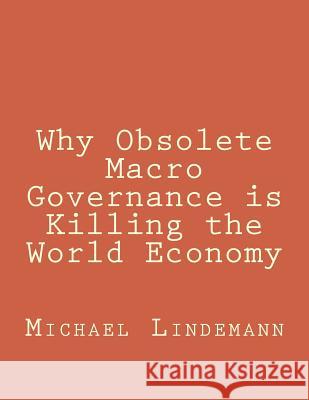Why Obsolete Macro Governance is Killing the World Economy: By Miguel Lindemann, a very experienced international businessman, not an economist » książka
Why Obsolete Macro Governance is Killing the World Economy: By Miguel Lindemann, a very experienced international businessman, not an economist
ISBN-13: 9781500588519 / Angielski / Miękka / 2014 / 448 str.
Why Obsolete Macro Governance is Killing the World Economy: By Miguel Lindemann, a very experienced international businessman, not an economist
ISBN-13: 9781500588519 / Angielski / Miękka / 2014 / 448 str.
(netto: 87,11 VAT: 5%)
Najniższa cena z 30 dni: 85,73 zł
ok. 13-18 dni roboczych.
Darmowa dostawa!
I wrote this book because I have a very strong feeling that a more pragmatic view of macro situations is necessary, this constituting an ambitious project. This book is not about "systematic pessimism," it recognizes that many economic factors need to be drastically reviewed first and revised after due in-depth analysis. It is not theoretical, it offers solutions, which are not "ASAP" but gradual and I believe realistic. Proposed solutions are based on an "active life in international working"in situ" in 3 continents and 7 different countries. I am not for opposing globalization or internet / IT development because they are not stoppable and part of the XXI Century's evolution; I am for finding solutions to take advantage of these realities. This means that governments cannot continuously "throw the can forward" and need to take on responsibilities to not only adapt to these huge changes but try to lead, this is and will be increasingly difficult, but if they do not change their political approach they will be the losers and accountable to the people they think they are governing. I have been referring to "events" that occurred during the last 2 to 3 years - and some well before, in order to stress that no real changes to rather non existing economic policies were made during these last years in the "Western World" - the US and Europe, separating the Eurozone. Monetary policies, and Central Banking, overwhelmingly "dictated" the behavior of nations, which is contrary to logic, since financial measures should "complement" financing required by a nations 'realistic and also ambitious social-economic view, plan and it's budgeting, and not precede them. By doing it in the contrary sense, there cannot exist financial targeting, because no economic priorities to be financed have been explicitly determined by the governments, which are led financially, mainly by Central Banking, which is senseless Polls over time showed that well founded and successful SMEs (biggest employer in any country) major problems are, in general, not able to access loans for their development, which generally consists of obtaining working capital facilities to expand locally and in export, depriving countries of a very dynamic element to provide badly needed durable growth. This book is about questioning if structural changes of the economy in the last 30 years have been assimilated and /or are in the process of being better understood by non specialized audiences, and whether private business procedures could be increasingly applied to macro vision, planning and analysis, and therefore include pragmatic analysis and decision making in a series of major macro points. Knowing that statesmen and politician background and activity are very different from that of businessmen, one of the main matters I want to address is whether good business procedures which are implicit in well managed private international business are partially applicable to macro evolution and performance analyses, this being a time of great and increasing macro volatility. I greatly believe that knowledge or "knowing" is a basic factor, that questioning is necessary in a world of affirmations, and that decision making is the result of both, this even more so in a huge crisis situation, which is still continuing, and which has no historical points of reference because of the huge changes in geo economy structure and politics, and in its sectoral / activities categories' structure. In the last 20 / 30 years the structure of GDP and Stock Exchanges changed dramatically: enormous changes in geo-economic structures, great sectoral changes mainly brought about by innovation: i.e. emergence of IT - internet and communications and in the last decade/s social networks, science, and various activity categories.











